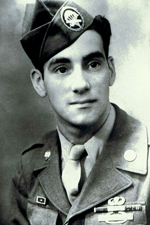Over Black Coffee & Gunpowder Tea
Served with

I would probably try to avoid this medical facility…. Jus’ sayin’

But, after eating that breakfast, you might want to know where the nearest Cardiac Care Center is located……

Served with

I would probably try to avoid this medical facility…. Jus’ sayin’

But, after eating that breakfast, you might want to know where the nearest Cardiac Care Center is located……

Vincent “Vince” J. Speranza (born 23 March 1925 in Manhattan, New York) was a American Private in the United States Army during World War II.
Vince was born on March 23, 1925 to Frank and Frances Speranza in the Hells Kitchen neighborhood of Manhattan, New York. He grew up on Staten Island in a large and extended Italian family during the depression. He also had three brothers (Rocco, Joseph, and Albert) and four sisters (Nancy, Frances, Concetta, and Rosemarie). He graduated from high school in January 1943 and enrolled at the City College of New York.
Vince went to the draft board after he had turned eighteen. He was drafted into the United States Army on October 25, 1943 and officially entered the service on November 15, 1943. He was sent to Camp Upton in New York where he stayed until he was sent to Fort Benning in Georgia where he trained for the Infantry with the 87th Infantry Division. He volunteered for the Parachute Infantry and was sent back to Fort Benning for training. He was sent overseas with Company H, 3rd Battalion, 501st Parachute Infantry Regiment, 101st Airborne Division from Camp Shanks on board the Queen Mary. His unit arrived in France and would later fight in the Battle of the Bulge.
Not too long ago he published a book titled Nuts!: A 101st Airborne Division Machine Gunner at Bastogne
Here he gives an oral account of “Airborne Beer”, which became quite the legend
Most recently, he decided it was time to take one more Jump.
How badass is THAT! Hooah, Pvt Speranza!

EDIT:
I cannot get the first link to open properly…Driving me nuts. So instead of hitting the link for the 1st one just insert this into your browser:
https://www.aarp.org/politics-society/history/info-09-2012/presidential-debates-pop-quiz.html#quest1
Norton seems to think it is a malicious site. It is AARP for heaven’s sake. Oh well, you can pass on the first quiz if you want.